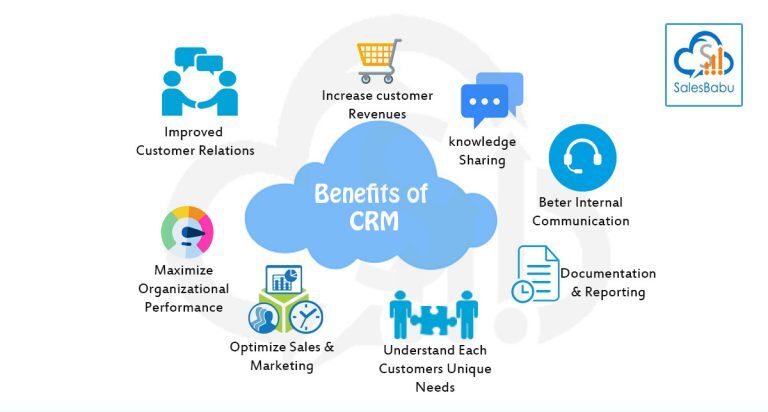Key Benefits CRM Systems Provide to a Business

Introduction to CRM Systems
What is a CRM System?
CRM (Customer Relationship Management) is an application software that helps in managing customer data, organizing interactions, and handling related business tasks especially of selling, marketing and servicing. It is the key for collecting and managing the data about customers where the businesses can develop the better understanding of their needs, enhance the level of satisfaction and, in the result, increase the revenue.
Why CRM Systems Are Essential for Business Organisations?
Customer Relation Management systems are an important component of the contemporary business environment. They help organisations particularly to engage with customers, improve their experiences and sell products and services more efficiently. Through integrating complete information of customers and potential customers CRM systems help a company to make rational decisions, to increase efficiency, and to gain a permanent success.
Key Benefits of CRM Systems for Businesses
More Effective Customer Relations
It is a system that enables business to make more effective customer relationship since it creates a pool of information on customers. They promote one-on-one communication, systematic follow up and offering of relevant products through marketing communication, in a bid to increase clientele loyalty.
Streamlined Sales Processes
CRM systems help in automating some of the strenuous task involved in the sales processes, managing leads and giving real time reports on the status of the sales funnel. This helps the sales teams to differentiate and import the leads, create sales revenue expectations, and, perhaps, close more deals.
Enhanced Marketing Campaigns
CRM enables endeavor to categorize its target market, market segment, and market asses and finally evaluate the effectiveness of the marketing campaigns. This results in better tackling of the appropriate consumer segments, the additional interest and increased efficiency of marketing communication activities, and, therefore, better marketing ROI.
Better Customer Maintenance and loyalty
CRM systems work by utilizing customer information to generate customer interaction possibilities for organizations, solve customer issues, and deliver satisfying client experiences. This results in the enhancement of customer loyalty, enhancement in repeat patronage and positive word of mouth communication.
High production rates, and excellent team work
Most CRM systems should help to optimize process, eliminate administrative tasks, and enhance cohesiveness between departments. Being way of integrated communication channel, CRMs improve productivity, effectiveness and cooperation in the team.
CRM / Customer Relationship Management Systems: How They Foster Business Growth
Boosting Sales and Revenue
CRM systems make sure that sales teams are armed with information about the customer’s needs, buying behaviour and buying history. This helps them to understand the opportunities for selling more products to existing clients, and sales lead scoring, and therefore, deal closure thus pushing sales growth and revenues.
Ways That CRM Analytics Can Help Enhance Decision Making
CRM systems collect and store huge amounts of information about customers, which in turn can be used to understand changes in market, customers and sales personnel. When implemented, CRM analytics help businesses get insights, make better decisions, and even improve their business approaches.
Promoting Business Growth
For growing companies, CRM system is beneficial as it scales up with the added customer data, accommodates more extensive sales funnels, and can become a home to a more extensive team. Position 1: Outsourcing helps businesses to change, grow and respond to the changing market needs more efficiently.
Key Features of CRM Systems
Contact Management
One of the most critical aspects of CRM systems is called contact management. It permits focus on customers, retain all client information, and record contacts and preferences for purposes of having an overall understanding of every client.
Sales Pipeline Management
Leads, opportunities and deals exist as different stages of sales pipeline in CRM systems and the management of these stages is made easier by the systems. This makes the approach to sales much more organized while providing accurate directions for forecasts and allows the sales staff to focus their work in the right places.
Marketing Automation Tools
Marketing automation is usually a part of integrated CRM solutions, for example, emails, leads, social media, etc. It assists businesses in those mechanisms which in turn assist in automating your marketing, targeting the right or specific customers and segmenting the right message to the customers thus improving their engagement rate or conversion rate.
Customer Service and Support Tools and Techniques
JCRM systems reveal features to address customer care and support interactions. This includes ticketing systems, case management, knowledge bases and two types of self-service portal. When the business customer support processes are centralized, businesses can quickly offer quality customer support hence satisfying the customers.
Reporting and Analytics
CRM can generate a comprehensive report to its users, helpful in monitoring sales, customer, marketing and other activities of the business. These insights may be used for decision making, strategy implementation and optimization and improvement.
Industry Specific Benefits Of Crm Systems
CRM for Small Businesses
In this case, it is possible to mention that CRM systems may be very useful for small businesses as it supplies information on customers and their interactions, makes the sales cycle easier and promote customer loyalty. It assists the small enterprises to stand a better chance against bigger enterprises by offering intimacy in customer relations as well as optimizing utilization of resources.
CRM for E-commerce Companies
In the case of e-commerce organizations, CRM systems are critical in relation to interacting with customers, documenting their purchase behavior, deploying direct marketing efforts and encouraging customer loyalty. It can inform about travelling of the client, work for customer loyalty, increase the quantity of times where a customer organizes to do business with the company.
CRM for Real Estate Agents
CRM systems can then be used by real estate agents to schedule property listings, monitor clients’ buying preferences and even communicate with them automatically. It makes the selling easier, allows better lead treatment, and keeps agents in charge of all the work, which means more closed deals.
CRM for Healthcare Providers
In the health care context CRM applications are applied in patient management, appointment scheduling and treatment planning. It is useful in engaging the customer and making individualised healthcare, and helps in developing better bonds between doctors and customers.
Best Practices in CRM and Challenges in CRM systems Implementation
Potential Problematique During CRM Implementation
For that reason, the introduction of a new CRM system can include some issues, for example, data transfer, user acceptance, integration of business processes. The above challenges should therefore be tackled through ideal training work, stakeholders, and business objectives in relation to the CRM implementation.
How to Counter CRM Implementation Problems
In order to avoid the problems related to CRM implementation companies should have appropriate strategic management methods, communications and change management plans in place. CRM initiatives require the broad involvement of all the employee base, managing expectations and ensuring constant assistance, and offering training to help in the cause.
Conclusion
Adopting of the CRM system in the healthcare sector has a number of advantages such as managing relationships with the patients, easier coordination of appointments among others. It was evident that there are various potential challenges during the process of CRM adoption but with adequate preparation, control and communication these they can be eliminated. Organizational commitment to CRM technology adoption can be achieved by involving employees and working with them, ensuring the implementation of CRM technology aligns with business goals’s, and offering support and training where necessary.Hence, health care providers can follow the above measures to see that CRM is adopted in the right way If healthcare organizations need to use CRM technology, they need to consider the following to ensure that adoption is done successfully. Implementing CRM technology enables the healthcare organizations to provide customized services, enhance the patient satisfaction and create long term HCP-Patient relationship and thus improving the effectiveness of the healthcare delivery system.







